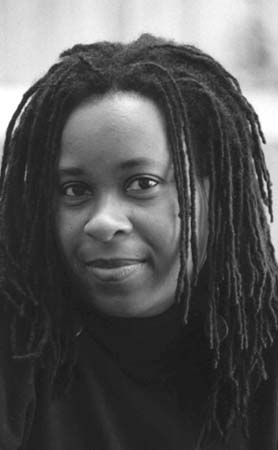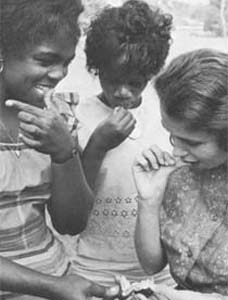
Central African Republic RPCV Evangeline Wheeler, Associate Professor of Psychology at Towson University, says "Historically, African American women have emerged as leaders from the field to the factories, in church basements and pews, and at the fronts and backs of the buses. It is important to find ways to use this knowledge of black women's activism in classrooms in higher education and in our communities."
Centering the Views of Black Women: Activist Pedagogy
in the Psychology Classroom
Evangeline A. Wheeler
Towson University in Maryland
It is still the case that Europeanized scholars from Western culture develop and frame most psychological theories from their own perspectives (Wheeler, 2002). Even though one attempts in the modern psychological research laboratory to include more representative samples in recognition of prior biases due to findings based on young, white, middle-class college students, most research subjects still do not reflect a fair portion of African Americans and other minorities (except in some cases, Asians).
[Excerpt]
Why Focus on Black Women?
Black American women are at a critical historical point (Reid-Merritt, 1996). Building on the scholarship of Toni Cade Bambara (who, ironically, urged black women to see the Euro-centered psychological construct of self-actualization as part of the political strategy in fighting oppression), Ntozake Shange, Angela Davis, Toni Morrison, June Jordan, Alice Walker, Audre Lorde and other black women academics from 1970s, African American women in the 1980s and 1990s developed a self-defined, collective black women's standpoint about black womanhood (Collins, 1990). Moreover, black women used this standpoint to "talk back" concerning black women's representation in theory and popular culture (Hooks, 1989). As a result, African American women's ideas and experiences have achieved a visibility in the academy unimaginable fifty years ago.
But African American and all black women now stand at a different historical moment. Though black women appear to have a respected voice, as idealized by the phenomenon of Oprah and the high-profile political position of Condoleezza Rice, with this newfound voice comes a new series of concerns. For example, black women must be attentive to the absorption of black women's voices in college classrooms where, often still, black women's texts are more welcomed than black women themselves. Giving the illusion of change, this strategy of symbolic inclusion masks how everyday institutional policies that suppress, and research programs that exclude black women remain virtually untouched.
Similarly, popular culture that transforms black women's writing into a marketable commodity also threatens to strip their works of any critical edge. Initially, entering public space via books, movies, and print media proved invigorating and empowering. But in increasingly competitive global markets where anything that sells will be sold regardless of the consequences, black women's voices now flood the market (especially in the area of popular fiction). Like other commodities exchanged in capitalist markets, surplus cheapens value, and the zeitgeist of today - the black woman’s point of view - becomes the historical footnote of tomorrow.
Based on a common history of oppression, whether from colonialism in Africa or slavery in the United States, most black women scholars have as their focus not the traditional Western feminist concern for individuality, but a more expansive and immediate concern for their larger communities (Smith, 1995). They struggle in many ways to overcome social and political oppression that is racist, sexist, and classist in nature. Like their predecessors, contemporary women of African descent have created alternate visions of survival. They have found ways to mobilize their communities through an activism that emphasizes spiritual, psychological, socioeconomic, and political survival. Historically, African American women have emerged as leaders from the field to the factories, in church basements and pews, and at the fronts and backs of the buses. It is important to find ways to use this knowledge of black women's activism in classrooms in higher education and in our communities.









